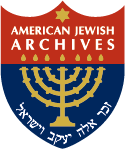A Finding Aid to the
David Einhorn Papers
Manuscript Collection No. 1551855-1909. 0.4 Linear ft.

|
A Finding Aid to theDavid Einhorn PapersManuscript Collection No. 1551855-1909. 0.4 Linear ft. |
![]()
ACCESS AND PROVENANCEThe David Einhorn Papers were received from various donors from 1954-1974. Property rights to the materials are held by the American Jewish Archives. Literary rights have not been dedicated to the public. Literary rights to materials authored by Einhorn are held by the Einhorn heirs, others are held by the individual author or his/her heirs. Questions concerning rights should be addressed to the Director of the American Jewish Archives.
The David Einhorn Papers are open to all users. The original manuscript collection is available in the reading room of the American Jewish Archives.
BIOGRAPHICAL SKETCH
top
David Einhorn was a Reform rabbi and theologian. Einhorn was born in Dispeck, Bavaria, and received his rabbinical training at Furth, near his birthplace. He studied philosophy at Erlangen, Wurzburg, and Munich. His thinking was influenced by the ideas of F. W. Schelling. In 1838 he was elected rabbi of the community at Wellhausen near Uffenheim, but the Bavarian government would not confirm his appointment on account of his liberal views. Four years later he became Landesrabbiner of Birkenfeld in the Grand Duchy of Oldenberg. At the Frankfort Rabbinical Conference of 1845, he took a decided view in favor of introducing the vernacular into the service and of eliminating prayers for the restoration of sacrifices and a Jewish state. Three years earlier, in coming to the defense of the position taken by Abraham Geiger in his controversy with Solomon Titkin, Einhorn had rejected the divine authority of the Talmud and upheld the right to diverge from ceremonial laws.
In 1847 Einhorn succeeded Samuel Holdheim as chief rabbi of Mecklenburg-Schwerin. There he was involved in controversy with Franz Delitzsch, the Christian Hebraist, for having pronounced a blessing in the synagogue over an uncircumcised child. Einhorn's radical religious standpoint jeopardized his position. In January 1852 he became rabbi of the Reform congregation of Budapest, but after two months the government closed the temple. While living in Budapest, Einhorn began his writing Das Prinzip des Mosaismus, but completed only one volume (1854).
Denied any opportunity in Europe, Einhorn became rabbi of the Har Sinai Congregation of Baltimore (1855). His arrival in the United States coincided with the Cleveland Rabbinical Conference, which, under the leadership of Isaac Mayer Wise, adopted a platform designed to permit a broadly based union among the various tendencies in American Judaism. Einhorn regarded this platform as treachery to the cause of Reform and denounced it violently. This marked the beginning of a bitter feud between Einhorn, the uncompromising Reformer, and I. M. Wise, who was ready to moderate his Reform views in the interests of unity. Einhorn expounded his ideas in his monthly magazine Sinai (Ger., 7 vols., 1856–62) and gave them expression in his prayer book Olat Tamid (1856), which was no mere shortening of the traditional liturgy, but a new work written mainly in German.
Einhorn's sojourn in Baltimore was cut short in 1861, when his unsparing denunciation of slavery placed him in danger from the mob. He became rabbi of Congregation Keneseth Israel, Philadelphia, and in 1866 moved to New York as rabbi of Congregation Adath Israel, which was later known as Temple Beth El. His was the dominant personality at the Philadelphia Rabbinical Conference which met in 1869 and adopted a thoroughgoing Reform platform.
Einhorn's farewell sermon, delivered after a quarter of a century in America, contained a plea for the cultivation of German as the vehicle for the ideas of Reform Judaism. If the dogmatic Reform upon which he insisted dominated neither the Union of American Hebrew Congregations nor Hebrew Union College at their inception, his spirit came to influence them later. Kaufmann Kohler, Einhorn’s son-in-law and disciple, formulated the Pittsburgh Platform of 1885, which was the basis of American Reform for a generation, and later became president of Hebrew Union College. Einhorn's Olat Tamid also served as the model for the Union Prayer Book.
A letter which Einhorn wrote in 1844 summed up his theological system: "In all its stages, Judaism shows its capacity for continuous development both as to its form and its spirit, insofar as the latter became ever clearer and purer in the human consciousness; and no Israelite who knows his religion will deny it the power of perfectibility. Its essence, which is truth uniting all men, was from the beginning intended to overcome the exclusiveness attached to the form, which is national; but insofar as the latter served as an armor of protection and as the priestly garb of Israel among the nations, it cannot with impunity be cast off until the former in its entire inner force and its all-encompassing extent will have penetrated the whole human family, and Israel (Mosaism) will have fulfilled its priestly mission at the arrival of the Messianic era." Little has been published concerning the personality of David Einhorn or analyzing his thought.[Sefton D. Temkin] Encyclopaedia Judaica
SCOPE AND CONTENT NOTE
top
The David Einhorn papers (1855-1909) consist of correspondence, writings, sermons, and memorials in English and German. Quite important are Einhorn’s letters with Kaufmann Kohler, his son-in-law and future president of Hebrew Union College together with those of Bernhard Felsenthal, an important Reform rabbi. All of these letters are in German. Marriage records cover the years 1866-1867 and 1878-1879 and are in English and German. The memorials to Einhorn were composed by Kaufmann Kohler and the Har Sinai Congregation, Baltimore, Maryland. Einhorn’s sermons are almost entirely in German.The collection is organized alphabetically in a single series.
BOX AND FOLDER LISTING
top
Box Folder Contents 1 1 General correspondence. 2 Felsenthal, Bernhard. 1861-1870. 3 Kohler, Kaufmann. 1869-1878. 4 Marriage Records. 1866-1867, 1878-1879. 5 Memorials. 6 Sermons. 1855-1876.top
Copyright © 2003 The Jacob Rader Marcus Center of the American Jewish Archives